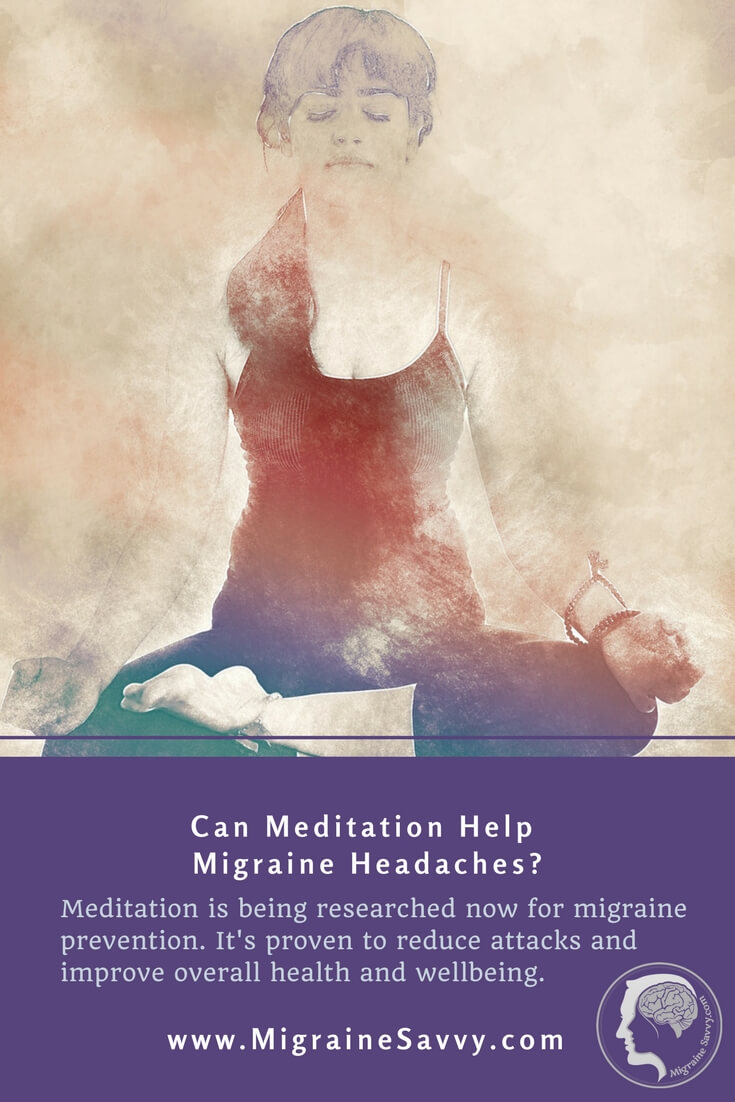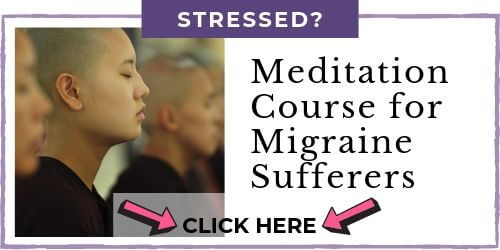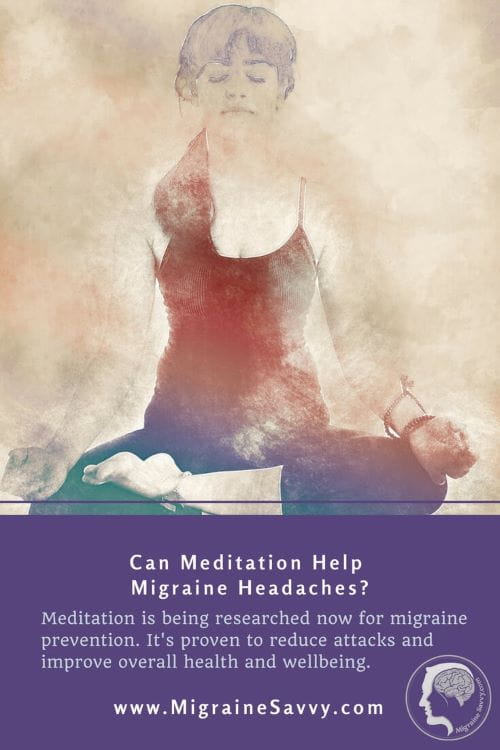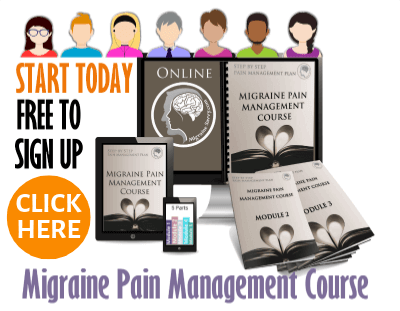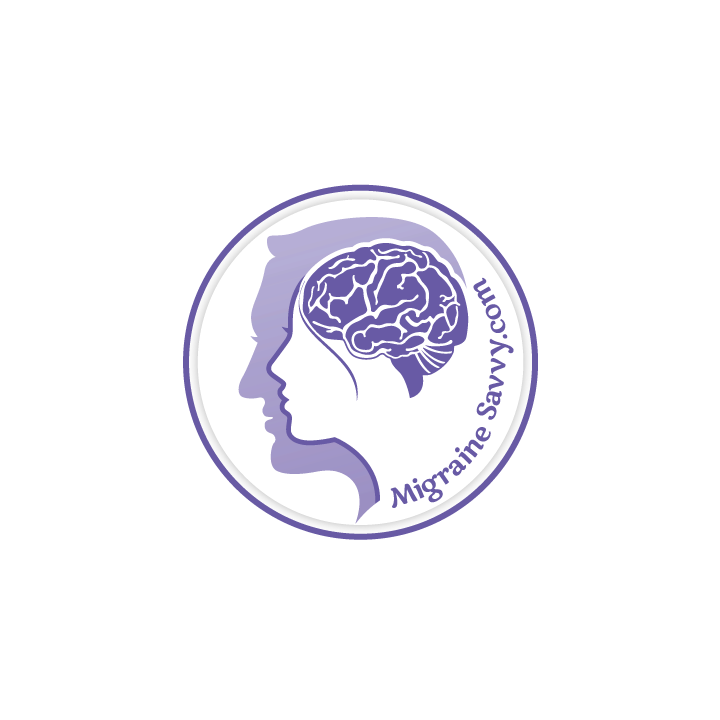- Home
- Meditation
COMPLETE MAGNESIUM SUPPORT
My Top Choice - Magnesium Breakthrough - The ONLY supplement with all 7 essential magnesium types in one formula. Most only have 1-2 types, leaving you deficient.
Meditation for Migraines: Imagine A Migraine Free Life
Can meditation help migraine headache? Meditation for migraines has been scientifically proven to help reduce severity and frequency of attacks. So...
Imagine a migraine free life. Truly! You can do basic meditation exercises anytime, anywhere. In traffic, waiting in a line up, at work (don't get caught), on the bus, on the train, waiting for the kids after school.
You can meditate anywhere. The benefits of meditation have been heavily researched and it's scientifically proven to help reduce migraines.
Scroll down or click here for 7 steps so you can start right now.
My #1 Choice in Magnesium Supplements
Dr. Herbert Benson, the pioneer and author of The Relaxation Response has been studying meditation and the mind body connection and its effects on our bodies for over 40 years now.
Meditation elicits the relaxation response which reduces stress and creates these health benefits like a reduction in migraine occurrence.
The mind is more open to receive new information when it's quieter, with less chatter and information coming in. More importantly, Dr. Benson says that your brain is hardwired to remember life before migraines.
So
essentially, once you quiet your mind, you can visualize a time of
wellness to encourage your body back to greater health and a migraine
free existence. So all you have to do is focus on a positive memory, a
time before your migraines, and you are ready to meditate. He called
this 'the placebo effect'.
The Placebo Effect Works Well to Encourage Wellness
Students at Harvard University are now working with the theory of the open mind, visualization, cognitive restructuring, and further group support to study the effects of the mind body connection and have had good results around pain management.
I know, you want me to get to the basic meditation for migraines exercises... but just a bit more waffling.
Dr. Benson says that “there is a smorgasbord of choice” - no one method will quiet your mind or help you to reach that place of silence within. There are many ways to elicit the relaxation response like: jogging, yoga or tai chi might work better than mindfulness meditation.
The runner’s high, is the relaxation response, brought about by the repetition the rhythm of your feet. Dr. Benson tells us that "it occurs normally in the third or fourth mile. It will occur in the second mile if you focus left, right, left."
He is a cardiologist by
training, so the importance of blood pressure elevations due to stress
started him on his journey until some people came along and asked him to
study them "we do Transcendental Meditation" they said. It's amazing
that we get to benefit from his brilliant mind.
If
you are someone who cannot sit still then you must find what you are
most comfortable with to get the best results. Repetitive prayer works
best for a lot of people too. All you have to do is spend the time,
10-20 minutes twice a day and you will have changes.
"The price for this is the time it takes, to do this twice daily, for 10-20 minutes. That is the issue ... "
To create change, you have to put in the time.
How To Get Started On Meditation for Migraines
Breathing properly is essential.
 Remember to breathe fully and deeply a few times every hour
Remember to breathe fully and deeply a few times every hourBreathing is a vital and essential area to become aware of. Not only in meditation but in everyday life.
I find if I remember to breathe fully and deeply a few times every hour, that my migraine frequency reduces.
I just have to remember the meditation for migraines practice and to use my diaphragm.
In preparation for the meditation for migraines exercises here are some basic things that are good to know:
• If possible find somewhere quiet to sit.
• Find somewhere you will be comfortable for 20 minutes. Personally I meditate for an hour at least before a migraine, or whatever I need - I make the time. Allow yourself the space for meditation for migraines in your day.
• Recall your memory of being migraine free to visualize or find an object to gaze at.
• Closed eyes for visualization.
• Open eyes for gazing.
• Sit for a minute to begin with your breath and allow 2 minutes to end your meditation for migraines.
• Allow your normal rhythm. Never force your breath in or out, don’t hold your breath.
• Breathe only through your nose.
• Try to maintain a “passive attitude”; don’t worry if thoughts intrude your silence. Expect them to - it is a natural function of the brain.
• There is no right or wrong way to do this, be gentle with yourself.
• Return to your breath if you get caught up in your thoughts.
• Allow your thoughts to come and go.
• Allow your emotions to arise and leave.
• Only lay down if you have to.
• If you fall asleep allow it. Meditate when you wake up again.
•
You may not want to or be able to visualize a pain free time when you
are too close to your migraine pain phase. This method does not use the
pain as a focal point, the intention is to take you away from the pain.
It is up to you - you can meditate during, away from or between
migraines.
And now, what you've been waiting for... the exercises.
7 Basic Steps to Imagining a Migraine Free Life
Here are your meditation for migraines steps to follow:
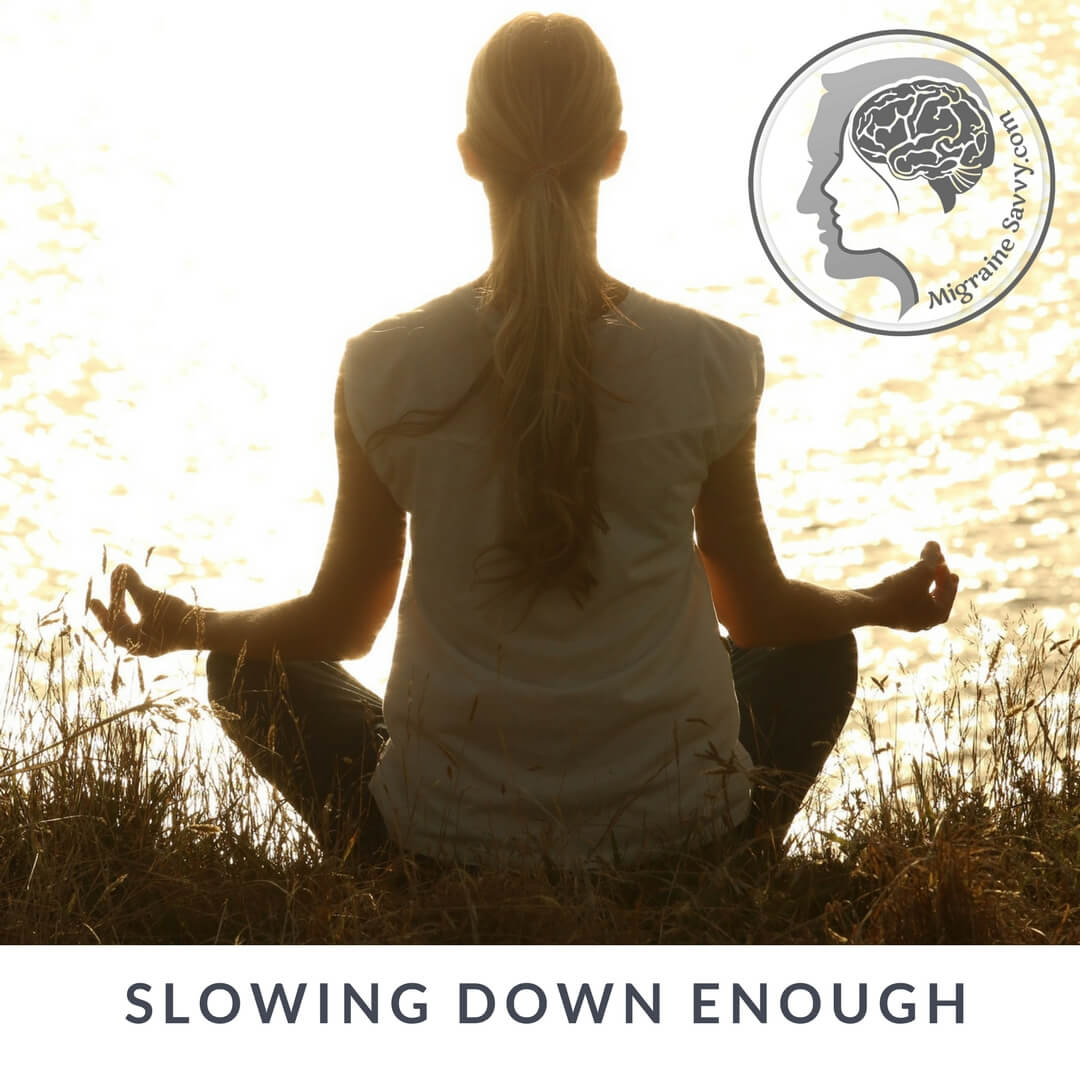 Meditation for Migraines
Meditation for MigrainesStep #1
Find a comfortable position to sit in, in a quiet place.
Step #2
Close your eyes if that's comfortable, and breathe in. Allow your lungs to move. Allow yourself to inhale and exhale, consciously, 3 deep breaths. Feel your diaphragm moving side ways, expanding with each deep breath.
Step #3
Consciously
begin to relax all your muscles. Start at your feet and wiggle your
toes. Move slowly and bring your awareness to your ankles, calves,
thighs, and buttocks. Feel the weight of your sitting bones on the
chair. Notice your abdomen, your spine, the whole torso. Roll your
shoulders, neck, arms and hands. Bring awareness to your head and face.
Allow everything to relax.
If you are lying down in bed
pre-migraine then just feel your weight on the bed and sink into your
bed. As above, move slowly through your body limbs, muscles and organs
to relax.
Step #4
Bring your awareness to
your breath. Remember to breathe only through your nose. Recall (if
you cannot recall a time, just day dream) or imagine a time – back –
when you were well. Allow yourself to fully be and feel the memory of
wellness. See yourself happy and full of energy. Free to do what you
wish. As you breathe enjoy your memory of your pain free, healthy state
of being.
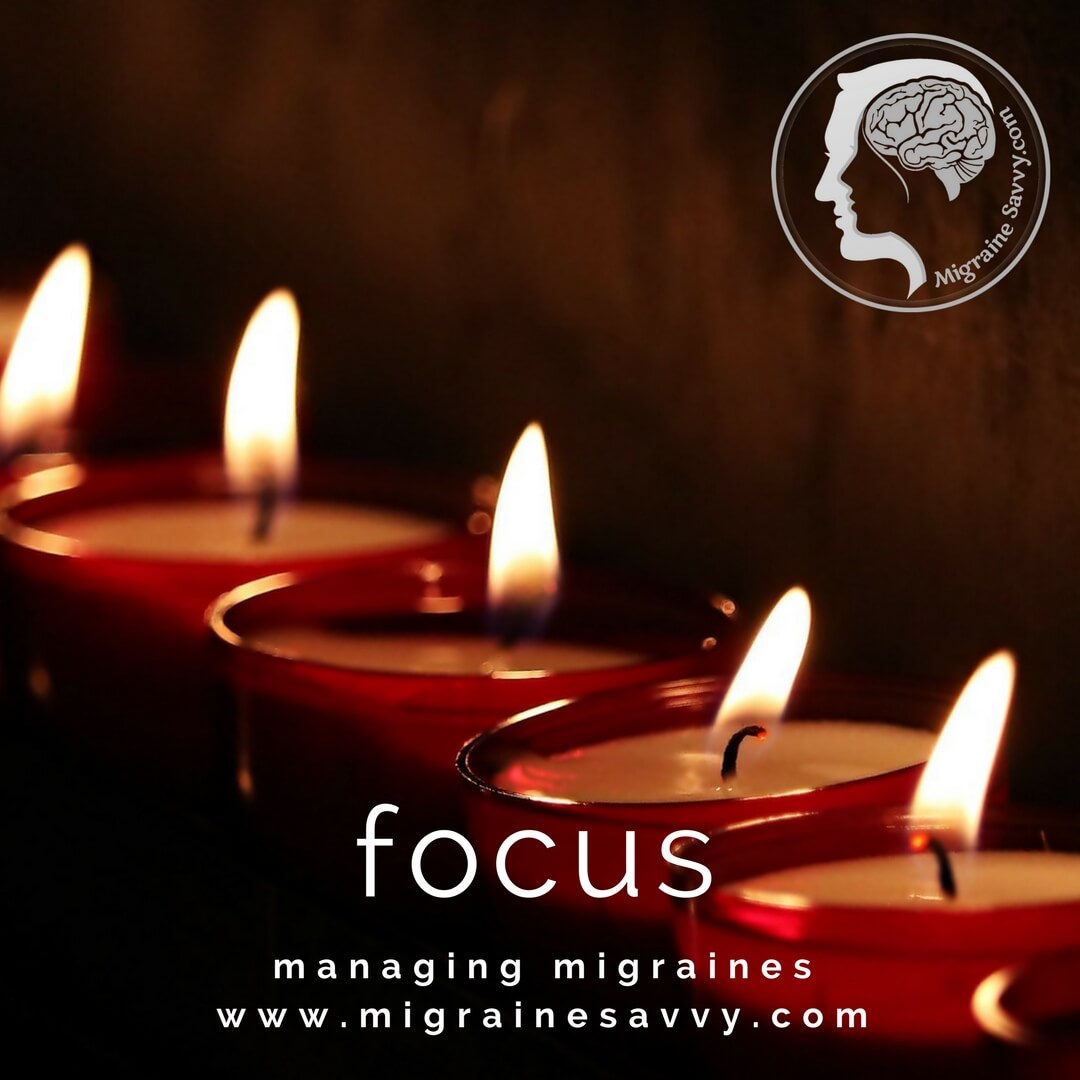 Stay in touch...
Stay in touch...Step #5
Continue this memory recall for 20 minutes or more as time allows. You can set a quiet, gentle alarm to let you know when your 20 minutes are up. Eventually your own internal body clock will automatically know when your time is up. Or if you are lying down, just let yourself fall asleep.
The best thing to do before a migraine is to induce sleep, if that’s possible.
Step #6
When you wake up, or if you just finish your basic meditation exercises, slowly bring your awareness back into the room, to your breath and your body, and remain seated or lying down for 2 minutes while you open and close your eyes to end your meditation. Rushing back to daily life is not recommended. Make sure you are back in your body before you stand up.
If this has eliminated your migraine, please rejoice! If it has not, you may need to start meditating again. You can meditate as often as you desire, time allowing, when you are attempting to deal with your entire migraine episode.
Step #7
So, for ending your basic meditation exercises, allow your normal thoughts back in. There is no wrong and no right way to do this. If thoughts intrude while you are recalling your healthy memory, then just become aware of that and return to your breath, and the scene you have chosen.
Try to be gentle with yourself and your busy mind and persevere. Dr. Benson says that “maintaining a passive attitude” is vital to the success of maintaining your regular practice.
WANT MORE TIPS? Subscribe to my newsletter and follow along on Facebook and Pinterest for all of the latest updates.
MIGRAINE MEDITATIONS Related Articles
How to be more MIGRAINE SAVVY right now...
Reference for Meditation for Migraines: Benson, H. M.D. (1975) The Relaxation Response. Harpers Collins Publishers: NY.

